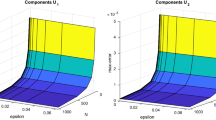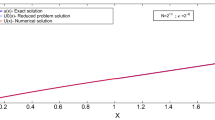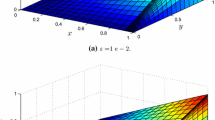Abstract
In this paper, an asymptotic numerical method based on a fitted finite difference scheme and the fourth-order Runge–Kutta method with piecewise cubic Hermite interpolation on Shishkin mesh is suggested to solve singularly perturbed boundary value problems for third-order ordinary differential equations of convection diffusion type with a delay. An error estimate is derived using the supremum norm and it is of almost first-order convergence. A nonlinear problem is also solved using the Newton’s quasi linearization technique and the present asymptotic numerical method. Numerical results are provided to illustrate the theoretical results.



Similar content being viewed by others
References
Bellen A, Zennaro M (2003) Numerical methods for delay differential equations. Clarendon press, Oxford
Cañada A, Drábek P, Fonda A (eds) (2006) Handbook of differential equations: ordinary differential equations, 1st edn. Elsevier Science, Amsterdam
Cen Z, Aimin X, Le A (2017) A high-order finite difference scheme for a singularly perturbed fourth-order ordinary differential equation. Int J Comput Math. https://doi.org/10.1080/00207160.2017.1339869
Chandru M, Shanthi V (2016) An asymptotic numerical method for singularly perturbed fourth order ODE of convection-diffusion type turning point problem. Neural Parallel Sci Comput 24:473–488
Chen S, Wang Y (2016) A rational spectral collocation method for third-order singularly perturbed problems. J Comput Appl Math 307:93–105
Christy Roja J, Tamilselvan A (2016) Overlapping domain decomposition method for singularly perturbed third order reaction-diffusion problems. Ain Shams Eng J. https://doi.org/10.1016/j.asej.2016.09.018
Christy Roja J, Tamilselvan A (2018) An overlapping schwarz method for singularly perturbed third order convection-diffusion problems. J Appl Math Inform 36:135–154
Doolan EP, Miller JJH, Schilders WHA (1980) Uniform numerical methods for problems with initial and boundary layers. Boole Press, Dublin
Glizer VY (2003) Asymptotic analysis and solution of a finite-horizon \(H_{\infty }\) control problem for singularly-perturbed linear systems with small state delay. J Optim Theory Appl 117:295–325
Gourley SA, Kuang Y (2004) A stage structured predator-prey model and its dependence on maturation delay and death rate. J Math Biol 49:188–200
Kuang Y (1993) Delay differential equations with applications in population dynamics. Academic Press, New York
Lodhi RK, Mishra HK (2016) Solution of a class of fourth order singular singularly perturbed boundary value problems by quintic B-spline method. J Niger Math Soc 35:257–265
Longtin A, Milton J (1988) Complex oscillations in the human pupil light reflex with mixed and delayed feedback. Math Biosci 90:183–199
Mahendran R, Subburayan V (2018) Fitted finite difference method for singularly perturbed delay differential equations of convection diffusion type. Int J Comput Methods 15:1840007-1–1840007-17
Murray JD (2002) Mathematical biology I. An introduction, 3rd edn. Springer, Berlin
Shanthi V, Ramanujam N (2002) Asymptotic numerical methods for singularly perturbed fourth order ordinary differential equations of convection–diffusion type. Appl Math Comput 133:559–579
Subburayan V, Mahendran R (2018) An \(\varepsilon -\) uniform numerical method for third order singularly perturbed delay differential equations with discontinuous convection coefficient and source term. Appl Math Comput 331:404–415
Valanarasu T (2006) An asymptotic numerical initial-value method for a class of singularly perturbed boundary value problems for differential equations. Dissertation, Bharathidasan University
Valanarasu T, Ramanujam N (2007a) An asymptotic numerical method for singularly perturbed third-order ordinary differential equations with a weak interior layer. Int J Comput Math 84:333–346
Valanarasu T, Ramanujam N (2007b) Asymptotic numerical method for singularly perturbed third order ordinary differential equations with a discontinuous source term. Novi Sad J Math 37:41–57
Valarmathi S, Ramanujam N (2002) An asymptotic numerical method for singularly perturbed third-order ordinary differential equations of convection-diffusion type. Comput Math Appl 44:693–710
Author information
Authors and Affiliations
Corresponding author
Additional information
Communicated by Corina Giurgea.
Publisher's Note
Springer Nature remains neutral with regard to jurisdictional claims in published maps and institutional affiliations.
Rights and permissions
About this article
Cite this article
Subburayan, V., Mahendran, R. Asymptotic numerical method for third-order singularly perturbed convection diffusion delay differential equations. Comp. Appl. Math. 39, 194 (2020). https://doi.org/10.1007/s40314-020-01223-6
Received:
Revised:
Accepted:
Published:
DOI: https://doi.org/10.1007/s40314-020-01223-6
Keywords
- Third-order differential equations
- Convection diffusion equation
- Boundary value problem
- Singularly perturbed problem
- Shishkin mesh
- Delay differential equations
- Asymptotic numerical methods




